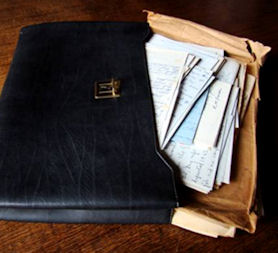Channel Island’s World War II forgotten heroes revealed
Documents outlining the bravery of Channel Islanders who resisted the Nazis in World War Two have been discovered after almost 50 years. Channel 4 News talks to relatives of those in the resistance.
A briefcase of documents outlining the bravery of Channel Islanders involved in resisting the Nazis in World War Two has been discovered after almost 50 years in the back of a wardrobe. The papers include descriptions of people who defied the Nazis and paid with their lives.
The lecturer at Cambridge University who analysed the documents says they give an insight into the range of resistance on the Islands and help complete the list of those who dared to protest that historians have not had before. They certainly paint a picture of the hardships so many people across Europe endured.
In one testimony, Cecil Duquemin writes of how, towards the end of the war, having been deported from Guernsey to a camp in Germany, he and 400 others were forced onto cattle trucks: “We had no sanitation on our journeys and though suffering starvation and malnutrition, we were forced to bury the many prisoners who died in the trucks. Unhappily this was a daily occurrence and we hardly had any strength left in us to dig the dead men’s graves.”
A woman who was told by the Germans that her husband had killed himself in one of their prisons writes that another prisoner told her that “my husband did NOT commit suicide, but was murdered by the Nazis. No direct evidence can be obtained to substantiate or deny this…”

The file came to light when a team from Cambridge University put an advert in a Guernsey newspaper asking for any information locals had about what went on under Nazi occupation. The daughter of one of those who had resisted the Nazis handed over an illuminating set of papers her father had painstakingly gathered in an effort to win compensation from the Germans in the 1960s.
The Channel Islands were invaded by Germany in 1940 after the British government took a decision not to defend them. For five long years the Channel Islanders lived under Nazi rule, suffering terrible deprivation and hardship. There are still many people living there who do not know what happened to their relatives.
The papers found in the wardrobe were put together by Frank Falla, an islander who ran an underground newsletter called Guernsey Underground News Service (GUNS) during the war. The Germans banned all radio, but Falla and others secretly tuned into the BBC and wrote up news from the Allied side which they distributed to fellow citizens.
This was the kind of “passive resistance” that took place on the islands: many of the men were already away fighting in the British army and, at times, there was one Nazi soldier for every two inhabitants which made more violent resistance difficult.
Frank Falla and other GUNS members were deported when they were caught, two of them died in Nazi hands. Falla’s testimony describes the conditions at the Gestapo-administered prison to which he was sent in Frankfurt:
“…all opponents of the Reich of all nationalities, who were chained in cellar cells and cried like animals, were being executed by the Nazis by guillotine at the rate of 25 per week….”
A fellow GUNS member was Joseph Gillingham. He was arrested just three months after his daughter Jean was born. He died in captivity, his body never found. His widow Henrietta Gillingham’s testimony was in the briefcase, detailing what other prisoners had told her about what happened to her husband: “He was ill-treated, starved and denied all the rights one would expect even from an enemy, for I received not a single letter from him, nor did I know whether he was alive or dead, or where he was…. He left Hamburg prison on February 2nd, 1945… but he was never seen after this… he was either put into a concentration camp, taken on a forced march against the Americans’ quick advance into the town, or killed. Not even to this day have I heard where he is buried or how he died….”
Channel 4 News spoke to Jean Harris, Joseph and Henrietta Gillingham’s daughter. She said she had always been proud of what her father had done and she wished she had asked her mother more about the details of his bravery, but it was always difficult to talk about.
These documents provide an insight into a subject that still creates tension on the islands where accusations of collaboration have always abounded. They detail the courage of people, many of whom have never been properly recognised before and are first-hand accounts of what the Germans did to those who resisted them.
“It’s so exciting, and really important,” says Dr Gilly Carr from Cambridge University who was given the files, “because in here are the details of the people who should be known as Guernsey’s resistance heroes.”
Although there is a monument to those islanders who fought and died for Britain, there is no similar honour to the men and women who resisted the Nazi occupation of their islands. Even those who did return from the camps were not publicised as heroes.
There is a hope now that, with this new and detailed material, that wrong will be righted and a monument naming these brave souls will finally be erected.
-
Latest news
-
Windrush scandal: returning to the UK after a forty year wait6m

-
Netanyahu ‘survival’ depends on ‘expanding war’ says head of Palestinian National Initiative5m

-
Proposed law change could strip parental rights from paedophiles5m

-
Hugh Grant settles privacy lawsuit against The Sun newspaper publisher2m

-
Post Office Scandal: what did top executive know?6m

-




